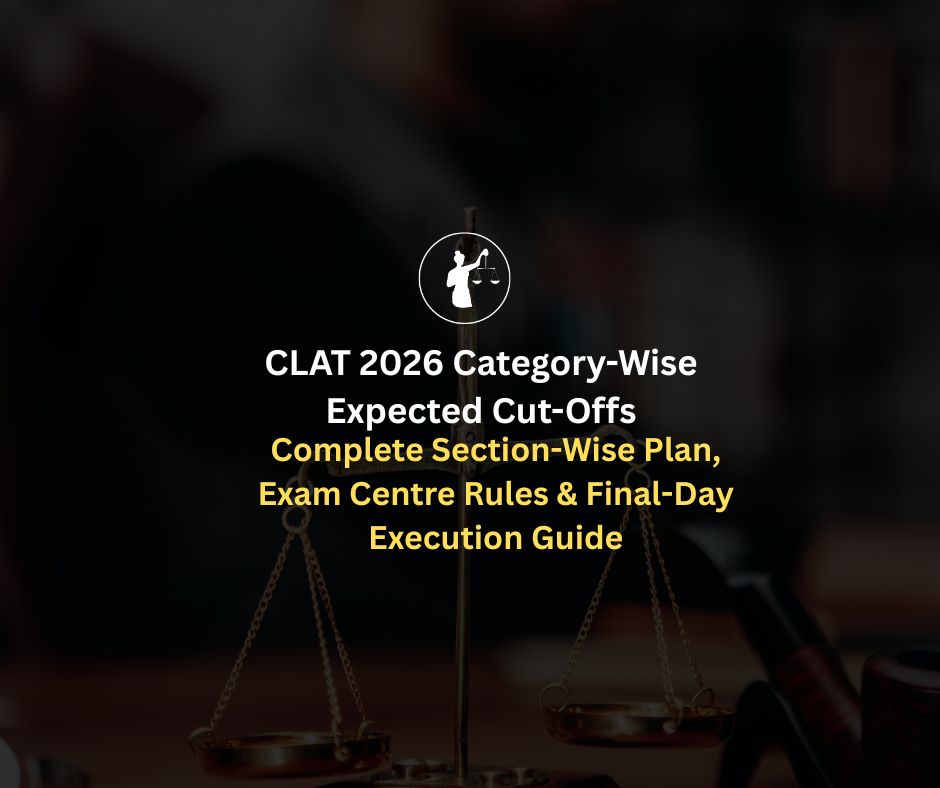
Join Our Telegram for Latest Updates
CLAT isn’t a memory game. It’s a skill game. And if your prep doesn’t reflect that, you’ll keep hitting a ceiling.
Let’s break down what each section really tests:
English: Can you read a nuanced, long passage and extract tone, intent, subtle meaning? Not just vocabulary.
Logical Reasoning: Can you track an argument, spot flaws, infer conclusions fast?
Legal Reasoning: Not about law knowledge — it’s about how sharply you apply a given principle.
GK: Current affairs pattern-based. Can you retain and recall events, themes, patterns?
Quant: Basic math, but under time pressure. More about confidence than calculation.
Insight no one tells you: The paper is not designed to test how much you know. It’s built to test how you think under pressure.
If you’re not actively building those cognitive muscles, syllabus coverage alone won’t cut it.
Coaching students get:
Daily classes
Assigned homework
Weekly mocks
Peer pressure
You get none of that. So you need to manufacture the structure. Here’s a simple but highly effective daily plan:
Morning (7 AM – 9 AM): GK + Vocabulary
Read from GK Today one-liners (backed by Drishti Monthly)
Make a 10-question daily quiz for yourself
Revise 20 old questions daily
Late Morning (10 AM – 12 PM): Legal Reasoning + Logical Practice
Use past year CLAT legal/logical questions
Alternate days: timed drills vs deep review
Afternoon (2 PM – 3:30 PM): English RC or Editorial Reading
Read The Hindu or Indian Express editorial
Practice 2 RC sets daily from NLTI mocks or past CLATs
Evening (5 PM – 6 PM): Quant or Misc Practice
Focus on confidence-building questions
Avoid wasting time on rare or extreme-level math
Night (8 PM – 9 PM): Error Log + Revision
Maintain a notebook of mistakes, weak vocab, incorrect inferences
Revise it weekly
Self-study is not about collecting PDFs — it’s about building a lean, reliable toolkit. Here’s how to do it right for CLAT only:
English + Critical Reasoning
CLAT PYQs (2010–2024) do them twice
The Hindu Editorials daily.
Word Power Made Easy vocab, 20 min/day.
GMATClub CR Bank for inference, weaken/strengthen practice.
> Focus on argument structure, not speed. CLAT rewards thought, not tricks.
Legal Reasoning
CLAT PYQs understand how principles apply, not just what the law is.
Bare principle-fact drills keep solving 10–15 per day.
PRSIndia.org & LiveLaw snippets for legal awareness and current judgments (no need to go deep).
> Legal in CLAT is logic-first. Reading comprehension with a legal twist.
GK + Current Affairs
GKToday: Daily One-Liners
Drishti IAS: Monthly CA PDF (English)
AffairsCloud Weekly Quiz Sets
Use the “Daily–Weekly–Monthly” rule:
Daily = updates,
Weekly = revision,
Monthly = quiz.
Quantitative Techniques
RS Aggarwal – Selected Chapters: averages, percentages, SI/CI, TSD, graphs.
CLAT PYQs specially data interpretation sets.
Testbook Practice Sets for pie/bar/line graph formats.
> CLAT maths is basic but time-bound. Focus more on speed than theory.
Don’t drown in resources outgrow them. Master one, extract its value, then move forward with clarity, not clutter.
No coaching means no one is sitting down weekly to review your performance. That job now falls on you.
But don’t just “wing it” build a repeatable review system that acts like your personal performance tracker. Here’s a structure that works:
Daily:
Tick off what you covered
Write down 1 clear lesson you learned
Note any question type you fumbled on (and why)
Weekly (Every Sunday):
Take one full mock
Log your section-wise score, time taken, and silly mistakes
Write a 3-line reflection:
What did I do well? Where did I waste time? What changes next week?
Monthly (End of every 4th week):
Take 4-5 mocks across the week
Calculate your average score and section-wise trends
Revisit your prep plan: is it working or just making you feel busy?
Advanced Tip: Create a “Weakness Tracker”
Most students track topics. Smart ones track skills.
Instead of just noting that you struggle in, say, RC — pinpoint that it’s “inference” questions you often get wrong. Or in GK, maybe you struggle with chronology or static-heavy questions.
This kind of diagnostic clarity is what coaching typically does for you — and what toppers learn to do on their own.
Self-study can feel like running a marathon alone — no cheerleaders, no teachers watching, no one to notice when you slip.
You’ll have high-motivation weeks and terrible ones. That’s normal. The trick is to not let bad days snowball into bad weeks.
Here’s how to stay consistent without draining yourself:
Find a Prep Partner
Not for being distracted. Just someone to share weekly scores with. Keeps your prep grounded in reality.
Use a 6-Day Study Cycle
Study hard Monday to Saturday. Keep Sundays for lighter tasks: revision, mock analysis, weekly planning.
Join a Serious Telegram Group
Lurking in focused groups like NLTI’s (not spammy channels) can keep you mentally aligned, especially during dull phases.
Take a Digital Detox Day Monthly
Pick one day each month no screens, no scrolling. Just books, walks, and reflection. You’ll return sharper.
Most ignored advice? Build study stamina.
CLAT doesn’t just test accuracy it tests how long you can stay mentally sharp across 120 minutes.
This stamina comes from deliberate focus practice, not binge-studying once a week or juggling prep with distractions. So train like an athlete: small, consistent efforts with rest and reflection built in.
Self-study shouldn’t mean endless reading.
Golden ratio: 70% practice, 30% review.
Your learning loop should look like:
Solve mocks
Spot what failed (timing, logic, panic?)
Revisit only the targeted theory
If you're reading more than you're solving, you’re preparing passively. Don’t just consume — train.
Waiting for the “perfect” time to take mocks? You’re stalling growth.
Start mocks from Month 1 even if you score 40.
Track sectional scores, not just total
Maintain a Mistake Log
Classify each error: Concept? Misread? Time pressure?
You don’t prep to get good scores. You prep to get good insights. And that only happens under mock pressure.
No one's watching your prep — so you need to be your own coach.
Daily: Log what you studied + 1 key insight
Weekly: 1 mock + reflection: "What worked? What wasted time?"
Monthly: Review mock trends. Update your plan.
Advanced move? Build a Weakness Tracker:
Not just “RC is weak”
But “inference-type RC Qs under time pressure = 60% accuracy”
CLAT isn’t a sprint — it’s mental endurance.
Use the Pomodoro Technique: 25 mins focus, 5 mins rest
Take one rest day/week: light revision only
Track prep on Notion or Trello: visualize progress
Plan a monthly detox day: no screens, full recharge
You’re building stamina, not just speed. Train like it’s a sport.
Scoring 60–70 consistently? Common reasons:
RC: Reading too slow or too shallow
GK: Inconsistent revision, not lack of knowledge
Legal: Skimming, not analyzing
CR: Limited practice across question types
Don’t just grind harder. Step back, spot the pattern, and fix it precisely.
Coaching isn’t the only way it’s just one way.
What matters more is whether you can stay consistent, track your mistakes like a strategist, and build habits that don’t burn out by October.
Some aspirants rely on full-time coaching, others go solo — and then there is our platform NLTI that quietly supports your prep with structure, mocks, and mentorship when you need it. And we do it for a fraction of what typical coaching centers charge.
Check Out: CLAT Online Coaching: Best Mentorship for CLAT 2026
Use what fits your rhythm. Because cracking CLAT isn’t about ticking boxes it’s about showing up daily with focus, clarity, and a prep style that actually works for you.





